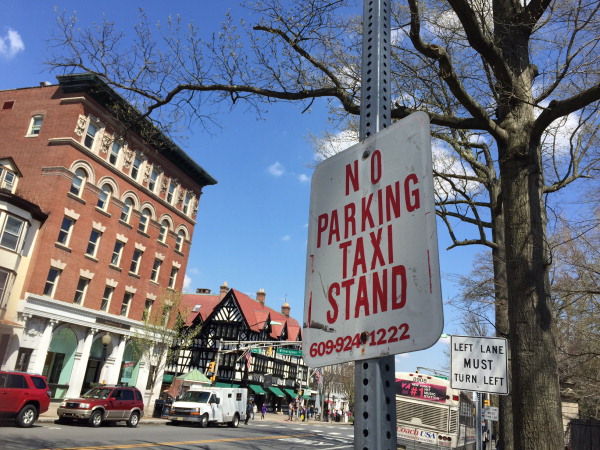By Philip Sean Curran, Staff Writer
Andy Hayban has been driving a cab in Princeton for 25 years, but business is way down, he said standing at the taxi stand on Nassau Street Thursday afternoon.
He can pinpoint the reason why.
Uber.
The car service that does not have to comply with the same local regulations as he does is affecting his bottom line; Mr. Hayban said his business is down 60 percent. Uber has been spotted at the Dinky station and even at the taxi stand, according to one frustrated fellow cabdriver.
“Our beef is with Uber,” said Gary Szurkus, owner of Princeton Area Transportation, a licensed taxi owner in Princeton and West Windsor. He is looking for the town to “enforce the law” when it comes to ride-hailing services. But so far, that has not happened.
“I don’t understand it,” Mr. Hayban said moments before someone approached him looking for a ride.
Both men point to all the regulations they have to comply with to do business in Princeton, steps that include being fingerprinted, maintaining commercial insurance and having a doctor certify they are medically fit to drive a cab. The town even requires them to have on their cars a sticker indicating they are a municipal taxi.
Mr. Szurkus pressed his case directly with the Princeton Council on Monday. “What we’re asking for is for you folks to help us,” he told the council in describing a “diminished” taxi business in town.
For her part, Mayor Liz Lempert said Thursday that she thought Princeton Police enforce the rules. Police Chief Nicholas K. Sutter did not return a phone call seeking comment.
“Honestly, this is one of those issues that everyone is struggling with internationally,” she said by phone.
Officials said it is a matter of prioritizing police resources when asked why authorities do not crack down, with Mayor Lempert saying cops cannot be “at every spot, at every moment.”
They note that there are residents who like Uber, which is popular with Princeton University students. Mayor Lempert said she had received a half dozen emails from residents telling her how important Uber was to them, this at the time two years ago when the town was looking at its taxi ordinance.
Uber spokesman Craig Ewer said in an email Thursday that “hundreds of thousands of people are choosing Uber because it provides an easy way to get a reliable ride at the push of a button.”
“Regulations for this new transportation system should be created at the state level, so that drivers and riders aren’t subject to a patchwork of conflicting municipal rules,” he said.
“There is the misconception that they’re legal here, but they’re not,” Councilwoman Jo S. Butler said Thursday of Uber.
State Assemblyman Reed Gusciora (D-15), also the Princeton municipal prosecutor, said Thursday that Uber should have the same insurance policies and background checks that taxi drivers do. He said that in the Legislature, there are bills to level the playing field. Yet at the same time, he said the taxi industry in the state needs to adjust how it does business.
The industry has “to adapt to the new matrix in ride-sharing that Uber has created,” he said.
But some towns have gotten tough with Uber. Newark, the state’s largest city, has proposed new regulations that include requiring drivers of Uber and other similar businesses to pay license fees.
Still, Mr. Szurkus said he would like to see Princeton enforce regulations the way neighboring West Windsor does at the Princeton Junction train station by issuing tickets. In the meantime, he and other cabdrivers worry about the future.
“Everybody’s frustrated,” he said.

